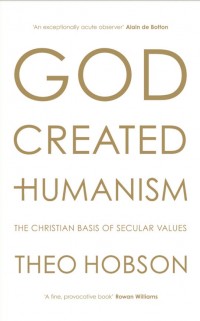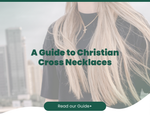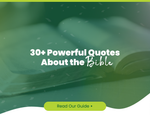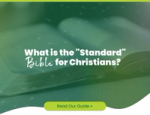God Created Humanism Review
Aaron Lewendon - Eden Bibles & Bible Study Specialist
Looking at the Christian history and relevance of Secular Humanism, God Created Humanism is Eden's Book of the Month for March.

For this month’s book choice, I decided to read a book by an author I had never heard of before: a category as wide as it is daunting. How do you pick a book you’ve never heard of, by an author you’ve never heard of?
Where do you begin?
Enter, God Created Humanism.
With such a wildly paradoxical title (and a recommendation from Alain de Botton), I was immediately hooked. Arguing for secular values that seem a world away from Christian values struck me as bold, daring, and (most importantly) interesting.
God Created Humanism is an incredibly focused book, and works with two distinct ideas:
Not an easy pill to swallow; especially since, being an avid reader of fiction, complex books on politics, theology, history, and philosophy carry a history of thought I know relatively little about. But, and for which I was relieved, that wasn’t a hindrance.
In the minds of many, Secular Humanism is vague: Theo Hobson makes no bones about that. For atheists, it’s a hazy ideal to be better as people, and to promote rights for all, but without understanding where the very ideas and feelings of rights or morality comes from. For many Christians, however, there is a blinkering knee-jerk reaction to Secular Humanism. We see the word ‘secular’ and reject the idea immediately. If it promotes equality and rights for all, doesn't it also allow people to worship whomever they want, and do whatever they want? Therefore undermining the absoluteness of Christianity?
This has led to it collectively being either misunderstood, or dismissed outright.
What about Secular Humanism, then, have we all got wrong?
The answer requires you to look back; to begin at the beginning.
Throughout the history of Western Christianity, there can be traced the spark of an idea that grows in the minds of the movers and shakers of faith. From the unflinching-humanism of the New Testament, to the rejection of Rome and of the constrictive religiosity that sprung from the reformation, and on through 500 years of thinkers (both for and against Christianity), as well as the profound impact of renouncing the slave trade, the idea of universal worth of humans has always been a seed planted by Christianity. This idea isn’t just mention by Theo Hobson, it is finely traced, followed through all of its stages with insight and research.
But so what? Surely it’s obvious that Christianity has been a light of compassion?
Why does that matter now?
This is where the book, for me, really hits its stride. Its purpose.
It only takes a few seconds online, or on the news, to see that divisions colour the world now more than ever. West/East, believer/atheist, Christian/Islam, Left/Right. Lines are being drawn more and more every day. It’s like we have forgotten, or just don’t want to remember, what unites us. Having a common creed is embarrassing: ‘I don’t want to be lumped in with them!’ ‘Traditions are just an embarrassing relic of primitive, mythological beliefs’ But really, it is important to acknowledge what we believe, and where it comes from. That our ideal of Secular Humanism still affects our thought, and is necessary to move forward.
So, what do we do?
First we (either as a people, nation, society- your choice) need to take Secular Humanism seriously if we are to have an answer to what needed to restore peace and compassion to the world. And secondly, that if we knowingly take Secular Humanism seriously, we may then need look at Christianity in a way that is equally serious, and discover the meaningful change it can bring, and the truth those ideals are founded in.
This brings me to the final chapter of the book that asks:
Why believe in Christianity anyway?
Isn’t possible, and has been put forward before, that we can just take the fruit of the tree, and not its root? Many see Christianity as incredible, beyond belief. This is where Theo Hobson proved most surprising to me (but also not, when you remember that modern herald of Humanism, Alain de Botton, regards Hobson so highly).
He paints faith as something that isn’t absolute, isn't stable, but is wrestled with every day. That there are things that seem beyond belief, and that the grand claims of Christianity are difficult to believe. But this isn’t something to overcome. But that absolute (and hard-headed) faith is not genuine faith at all, but is lacking the psychological honesty that says ‘yes, this belief is impossibly demanding, but I will carry it anyway’.
If we are open, and say that faith is not so much a rejection of the world, but rather a choice to keep one foot in the fantastical, we can then honestly say that there is real meaning in the world. That there is truth behind morality and humanism, and that although this way is a burden, ‘the burden is light’.
God Created Humanism is available from Eden.co.uk and can check off 'A book by an Author You've Never Heard of' from the Eden 2017 Reading Challenge.
.jpg)
Latest Blogs

Gifts
Finding Your Symbol of Faith: A Guide to Christian Cross Necklaces
Looking for the perfect symbol of faith? Explore our guide to Christian cross necklaces, from rustic wooden designs and sturdy men's chains to elegant silver pendants.

Gifts
The Best Christian Gifts for Under £20
Looking for a meaningful gift that won't break the bank? Explore our guide to the best Christian gifts under £20, from inspiring journals to beautiful home decor.

Gift Guide
15 Confirmation Gift Ideas for Boys and Girls
Celebrating a confirmation? Discover 15 meaningful gift ideas for boys and girls, from youth Bibles and jewellery to inspiring journals and keepsakes.

Bible
30+ Powerful Quotes About the Bible (For Inspiration in 2026)
Looking for inspiration? Discover a curated collection of the most powerful quotes about the Bible, from famous historical figures to modern theologians and Scripture itself.

Bibles
What is the "Standard" Bible for Christians?
Is there an "official" Bible that all Christians use? We explain the difference between the NIV, KJV, and ESV, and help you find the standard text for your church or personal reading.

Bible
"I Keep Failing to Read the Bible" – 5 Tips to Make the Habit Stick
Do you start a Bible reading plan only to quit a few weeks later? Stop the cycle of guilt. Here are 5 psychological tips and practical changes to help you build a Bible habit that actually lasts in 2026.
